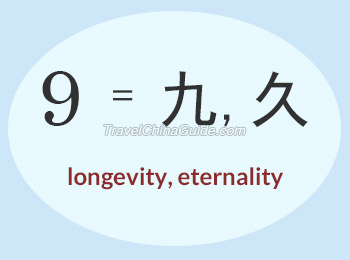Lucky Number 9
General Analysis
 Endowed with the gift to serve others, people with the lucky number 9 are able to freely create an easy and relaxed atmosphere. They make people around them laugh and encourage them to live a colorful life. They are very considerate in taking good care of anyone in need of help. With an inborn free soul, many people, having 9 as the lucky number, never stop weaving their dreams. They can usually realize these dreams as long as they have the practical plans and real actions. However, they are likely to boast a lot with little real action. They can hardly be successful unless they take dream-seeking actions. In general, they have rich imagination, universal love and kind-hearted sympathy.
Endowed with the gift to serve others, people with the lucky number 9 are able to freely create an easy and relaxed atmosphere. They make people around them laugh and encourage them to live a colorful life. They are very considerate in taking good care of anyone in need of help. With an inborn free soul, many people, having 9 as the lucky number, never stop weaving their dreams. They can usually realize these dreams as long as they have the practical plans and real actions. However, they are likely to boast a lot with little real action. They can hardly be successful unless they take dream-seeking actions. In general, they have rich imagination, universal love and kind-hearted sympathy.Romantic Relationship
No. 9 in Chinese Culture
Since Nine, the highest single-digit number in base ten, stands for completeness and eternity, many emperors in the ancient China love the number a lot. ‘Nine Continents’ is used to describe the large territory of an empire. The emperors wore Nine-dragon Imperial Robes, ordered to construct Nine-dragon Walls and other buildings with relationship with number 9 in the imperial palaces, to show their great power, hope for longevity, and eternal reign of their empire.
The world-famous Forbidden City in Beijing is a representative palace of Nine. In this magnificent imperial palace of China’s Ming (1368 - 1644) and Qing (1644 - 1911) Dynasties, the total number of the rooms is 9, 999 and a half. The three major halls - Hall of Supreme Harmony, Hall of Central Harmony and Hall of Preserved Harmony - are all of a height of 9 Zhang and 9 Chi (about 108.2 ft; Zhang and Chi are both ancient Chinese length unit). There are 81 doornails in nine rows and nine columns on each gate. The number of almost all the stairs is nine or a multiple of nine. Apart from the Forbidden City, the construction of the Summer Palace and the Temple of Heaven are also based on number 9.
Thanks to the special propitious meaning, number 9 and its multiples are also liked among Chinese folk. The Nines of Winter (Shu Jiu) is a popular folk song recording the weather changes during the nine periods of nine days each following the Winter Solstice. Besides, the 36 (9*4) Military Strategies from ancient China, the 72 (9*8) Metamorphoses of the Monkey King and the 81 (9*9) Tribulations in the Journey to the West are all widely-known stories in China.
- Last updated on Sep. 04, 2024 -